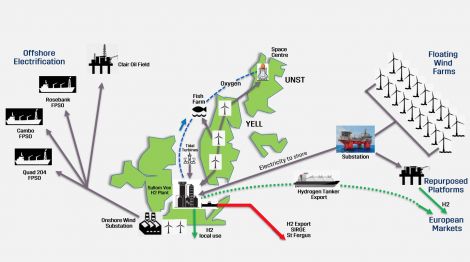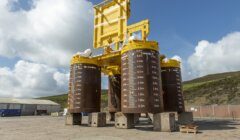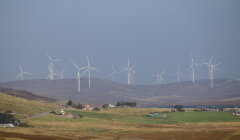Energy / Low carbon future needs collaboration and pilot projects, study finds
THE LOW carbon energy potential for the north east of Scotland including Shetland is compelling – but it needs close collaboration between key players and several pilot projects to establish whether new technologies would perform as intended.
And for Shetland to capitalise fully from renewable energy developments on and offshore, the isles will have to play an active role in the impending energy transition.
These are two of the conclusions coming from a new techno-economic study which local consultancy firm Voar Energy was closely involved in.
A summary of the study, carried out for Shetland Islands Council (SIC) and the Net Zero Technology Centre by global engineering company Worley, consultancy group Wood Mackenzie and Voar Energy, is now available here.
The study confirmed that the “incredible economic opportunities” of the “green energy potential” in the northeast and in Shetland are very real, but it will only be until the 2030s before multi-gigawatt offshore floating wind projects are a realistic option.
The SIC’s executive manager for future energy Douglas Irvine welcomed the study, adding that its conclusions should now be followed up with “more detailed investigations and engagement with the Shetland community”.
Among other things the study recommends:
- Closer collaborations between industries and regions;
- Joint planning for an additional substation for Shetland’s electricity network to allow offshore electrification and create capacity for future generation such as tidal energy;
- A pilot floating offshore wind project to test the technology in the harsh climate of the northeast Atlantic;
- Multi-megawatt green hydrogen pilot projects;
- Studies and first projects into alternative fuels transition such as hydrogen, bio-diesel and ‘drop-in’ low carbon fuels.
- Strategic and collaborative planning for infrastructure, logistic and skills transition.
One of the authors of the study, Voar Energy’s technical director Adam Priest, said that there was no doubt in his mind that Shetland will have to play an active part in the transition.
Become a member of Shetland News
“Shetland get to do this rather than having it done to it; it has to happen on our terms,” he told Shetland News.
He added: “To accelerate the energy transition, continued collaboration is needed on subjects as diverse as skills planning, electrification, infrastructure, and supply chain development.
“Wider regional collaboration also plays to the strengths of our unique geographical attributes and must form a part of effective stakeholder engagement going forward.”
Become a member of Shetland News
Shetland News is asking its many readers to consider paying for membership to get additional features and services: -
- Remove non-local ads;
- Bookmark posts to read later;
- Exclusive curated weekly newsletter;
- Hide membership messages;
- Comments open for discussion.
If you appreciate what we do and feel strongly about impartial local journalism, then please become a member of Shetland News by either making a single payment, or setting up a monthly, quarterly or yearly subscription.















































































